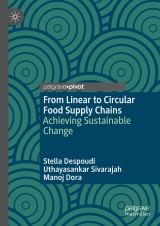Details

From Linear to Circular Food Supply Chains
Achieving Sustainable Change|
CHF 71.00 |
|
| Verlag: | Palgrave Macmillan |
| Format: | |
| Veröffentl.: | 22.07.2021 |
| ISBN/EAN: | 9783030726737 |
| Sprache: | englisch |
Dieses eBook enthält ein Wasserzeichen.
Beschreibungen
<p>This book aims to provide the reader with an understanding of the concept of the circular economy, in relation to food supply chains. The current food supply chain system, based upon the linear supply chain model, is unquestionably unsustainable: make, use, dispose. The circular supply chain model, on the other hand, aims to keep resources in use for as long as possible, while regenerating products/materials at the end of their service life. In short: reduce, reuse, recycle.</p><p>This book puts forwards the circular economy as an alternative to the traditional supply chain management models. The circular economy aims to minimise material, energy and environmental damage without restricting economic growth and social and technological progress. It involves transition to renewable energy sources, and it builds on economic, natural and social capital. </p><p></p>
<p>This shortform monograph will appeal to academics working in the fields of supply chain logistics, operation management, agricultural management, and sustainability more broadly.</p><p><br></p><p></p><p><b>Dr. Stella Despoudi</b> is Lecturer in Operations and Supply Chain Management at Aston University, UK and Adjunct Lecturer in Supply Chain Management at University of Western Macedonia, Greece.</p><p><b>Prof. Uthayasankar Sivarajah</b> is Head of School of Management and Professor of Technology Management and Circular Economy at the School of Management, University of Bradford, UK.</p><p><b>Dr Manoj Dora</b> is Director of Collaborative Projects and Outreach at Brunel Business School, UK. Manoj's areas of specialisation are Sustainable Value Chain and Quality Management, with a focus on Lean Six Sigma in the agro-food sector.</p><p></p>
<p>This shortform monograph will appeal to academics working in the fields of supply chain logistics, operation management, agricultural management, and sustainability more broadly.</p><p><br></p><p></p><p><b>Dr. Stella Despoudi</b> is Lecturer in Operations and Supply Chain Management at Aston University, UK and Adjunct Lecturer in Supply Chain Management at University of Western Macedonia, Greece.</p><p><b>Prof. Uthayasankar Sivarajah</b> is Head of School of Management and Professor of Technology Management and Circular Economy at the School of Management, University of Bradford, UK.</p><p><b>Dr Manoj Dora</b> is Director of Collaborative Projects and Outreach at Brunel Business School, UK. Manoj's areas of specialisation are Sustainable Value Chain and Quality Management, with a focus on Lean Six Sigma in the agro-food sector.</p><p></p>
<b>Chapter one: Introduction to Circular Supply Chains</b><p><b>Chapter two: Sustainability Challenges in Food Supply Chains</b></p>
<p><b>Chapter three: The transition from linear to circular food supply chains</b><br></p>
<p><b>Chapter Four: The key principles of Circular economy in food supply chains and relevant applications</b><br></p>
<p><b>Chapter five: Applications of Circular economy principles in food supply chains</b><br></p><p></p>
<p><b>Chapter Six: Opportunities and challenges of Circular Food Supply Chains</b></p>
<p><b>Chapter three: The transition from linear to circular food supply chains</b><br></p>
<p><b>Chapter Four: The key principles of Circular economy in food supply chains and relevant applications</b><br></p>
<p><b>Chapter five: Applications of Circular economy principles in food supply chains</b><br></p><p></p>
<p><b>Chapter Six: Opportunities and challenges of Circular Food Supply Chains</b></p>
<p><b>Stella Despoudi</b> is Lecturer in Operations and Supply Chain Management at the Aston Business School, UK. She has published research papers in the area of food supply chain management in internationally recognised operations, supply chain management, and engineering journal. Her expertise is in mixed-methods research in agricultural supply chain management. </p><p><b>Prof. Sankar Sivarajah</b> is Head of School of Management and Professor of Technology Management and Circular Economy at the School of Management, University of Bradford, UK.<br></p><p><b>Dr Manoj Dora</b> is currently the Director of Collaborative Projects and Outreach at Brunel Business School. He is head of the Operations & Information Systems Management Group.</p><div><br></div>
<p>This book aims to provide the reader with an understanding of the concept of the circular economy, in relation to food supply chains. The current food supply chain system, based upon the linear supply chain model, is unquestionably unsustainable: make, use, dispose. The circular supply chain model, on the other hand, aims to keep resources in use for as long as possible, while regenerating products/materials at the end of their service life. In short: reduce, reuse, recycle.</p><p>This book puts forwards the circular economy as an alternative to the traditional supply chain management models. The circular economy aims to minimise material, energy and environmental damage without restricting economic growth and social and technological progress. It involves transition to renewable energy sources, and it builds on economic, natural and social capital. </p><p></p><p>This shortform monograph will appeal to academics working in the fields of supply chain logistics, operation management, agricultural management, and sustainability more broadly.</p><p><br></p><p></p><p><b>Dr. Stella Despoudi</b> is Lecturer in Operations and Supply Chain Management at Aston University, UK and Adjunct Lecturer in Supply Chain Management at University of Western Macedonia, Greece.</p><p><b>Prof. Uthayasankar Sivarajah</b> is Head of School of Management and Professor of Technology Management and Circular Economy at the School of Management, University of Bradford, UK.</p><p><b>Dr Manoj Dora</b> is Director of Collaborative Projects and Outreach at Brunel Business School, UK. Manoj's areas of specialisation are Sustainable Value Chain and Quality Management, with a focus on Lean Six Sigma in the agro-food sector.</p><p></p>
<p>Provides a comprehensive guide on why we need to transition from a linear food supply chain to a circular one.</p><p>Examines the benefits and challenges of the circular economy.</p><p>Uses case studies to ground academic theory in real-world application</p>
Diese Produkte könnten Sie auch interessieren:

Heilpflanzenkunde für Tierärzte

von: Jürgen Reichling, Rosa Gachnian-Mirtscheva, Marijke Frater-Schröder, Reinhard Saller, Assunta Di Carlo, Wolfgang Widmaier

CHF 56.00















